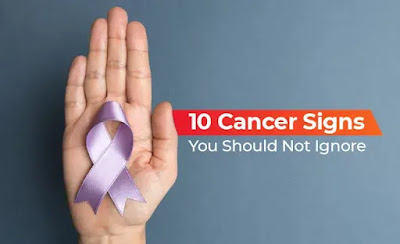Early signs of cancer that can be life-threatening if ignored.
When most people hear the word cancer, they associate it with a dangerous disease that has fatal consequences.
But since the 70s, survival rates for people with cancer have tripled, largely due to innovations in diagnosis.
And, in fact, favorable outcomes for most cancer patients are possible when the cancer is diagnosed before it has progressed too far.
The problem is that many times, because we don't give enough importance to the doctor, we overlook some of the symptoms that can be very important for early diagnosis.
According to a study by Cancer Research UK, more than half of Britons have experienced one of the symptoms of cancer at some point, but only 2% thought they had. They may suffer from this disease and more than one person completely ignores it and does not go to the doctor.
Katrina Whittaker, a researcher at University College London and lead author of the study, says: 'People think we shouldn't be encouraging people to be 'hypochondriacs', to be people who only care about their health all the time. And keep thinking about the physical and just keep yourself busy in that work, but we must complain about those people who shy away from going to the doctor because they believe that they will waste your time and health. will waste the system and their resources in vain.'
The BBC lists 10 common cancer symptoms you shouldn't ignore, according to the American Cancer Society.
1. Losing weight
Most people with cancer lose weight.
When you are losing weight for no apparent reason, it may be called unexplained weight loss.
Weight loss of five kilograms or more can be the first sign of cancer.
This usually occurs in gallbladder, stomach or lung cancer.
2۔ Steam
Fever is common in patients who develop cases, although this is more common when the cancer has spread from where it started.
Anyone affected by cancer is prone to fever, especially when the cancer or its treatment affects the immune system of the human body.
Sometimes fever can be an early symptom of a cancer such as leukemia or lymphoma.
3. Fatigue
It is a fatigue that does not go away even with rest. This can be an important sign that the cancer has spread.
However, in cancers such as leukemia, the feeling of fatigue first disappears.
Colon or stomach cancer may cause anemia that is not obvious at first. This is also a reason for feeling tired.
4. Skin changes
In addition to skin cancer, some cancers can cause skin changes.
Signs of skin changes include;
Changes in skin color
Yellowing of the skin and eyes
Redness of the skin
Itching
Excessive hair growth
5. Stomach or bladder problem
Dysentery or a prolonged change in stool color may be a sign of colon cancer.
On the other hand, pain while urinating, bleeding with urine or excessive or scanty urination are also signs of bladder or prostate cancer.
6. Wounds that don't heal
Many people know that when moles start to grow or become painful or bleed, it can be a sign of skin cancer, but we should also pay attention to small lesions that last more than four weeks. I don't fill either.
A wound that doesn't heal can be caused by mouth ulcers.
Any changes in the mouth that persist for a long time should be addressed by a doctor or dentist.
Abscesses on the genitals can also be an early sign of cancer and should be checked.
7. Bleeding
Abnormal bleeding can be an early or advanced sign of cancer.
Coughing up blood from the mouth can be a sign of lung cancer.
On the other hand, rectal bleeding that is darker in color can be a sign of colon or rectal cancer.
Cervical cancer of the endometrium, the lining of the uterus, can cause abnormal vaginal bleeding.
Bleeding in the urine is a sign of kidney or bladder cancer.
Bleeding from the nipple in women is possible due to breast cancer.
8. A substance on the body
Symptoms of such cancers are seen in the breasts, lymph nodes or soft tissue of the body.
If you feel a hard substance on the body, it may be due to cancer.
. Difficulty eating
Persistent indigestion or difficulty eating can be a sign of cancer in the esophagus or esophagus. It also occurs in stomach or throat cancer.
However, these symptoms can also be a sign of another disease.
10. Frequent cough
A cough that won't stop can be a sign of lung cancer.
If you have a cough for more than three weeks, it is advisable to consult a doctor.


.jpeg)
.jpeg)
.jpeg)
.jpeg)

.jpeg)
.jpeg)
.jpeg)
.jpeg)

.jpeg)

.jpeg)

0 Comments